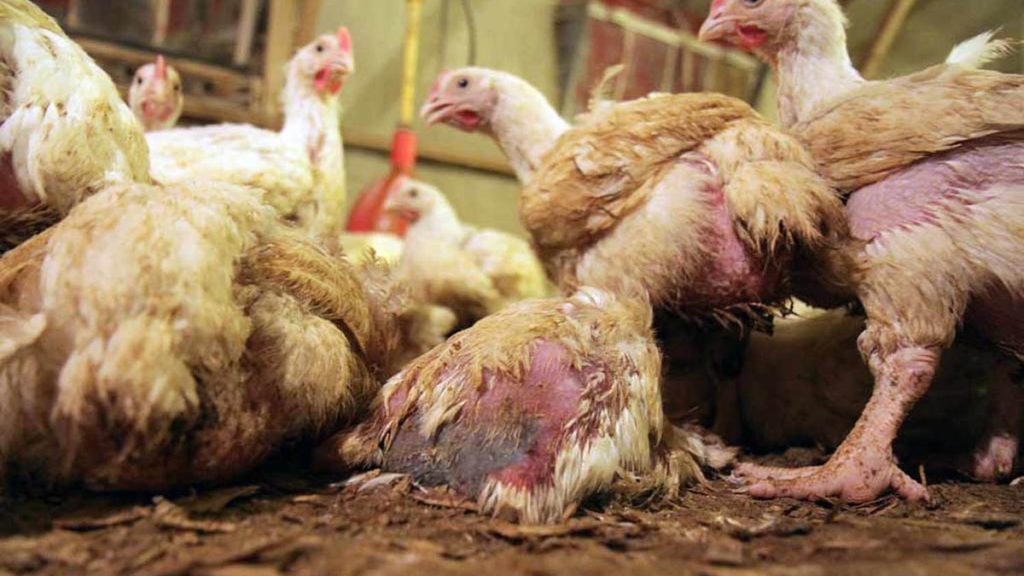Animal Rights and Incremental Change

This is a pretty interesting article about Utah’s new cage-free law for chickens, which Jan Dutkiewicz writes in The New Republic might in fact be counterproductive. That’s because the law still doesn’t allow chickens enough room to spread their wings or act like a chicken is supposed to act. He rightfully points out that the problem is factory farming and the entire food system. Now, we can pretend like the animal rights movement is being ridiculous or is concerned with issues that are never going to win because people like meat (disclosure: I made chicken for dinner last night). That might be true I guess on the latter, but it’s hard to deny the truth behind what they are saying. We just pretend like we don’t know it. Where I found the essay particularly interesting though is on the issue of how political change is created and the hard work it takes.
But we don’t need to take hard-line positions on animal rights to question the logic of pursuing incremental changes to animal production like going cage-free. Not only are the welfare benefits of cage-free farms questionable, but winning cage-free legislation is hard work. Currently, mostly due to the efforts of groups like HSUS, about 30 percent of the country’s egg-laying hens are free from cages. But of the country’s five biggest egg-producing states, only California, where voters are uniquely motivated to vote for animal welfare improvements, has cage-free legislation passed. (Utah isn’t even in the top 10 in terms of egg production capacity.) Winning similar victories in hard-line ag states like Iowa and Ohio will be harder. And it’s unclear whether winning cage-free commitments builds momentum for other wins. Even without such regulations, egg producers happily advertise cage-free eggs on cartons and charge premium prices for them. If groups like HSUS advertise cage-free as a major win for animals, many consumers may be placated that their eggs are humane, after all. Convincing them with future campaigns that that’s not actually the case might not work. And none of this addresses the myriad other harms of chicken agriculture, such as chick culling or the impacts on workers, the environment, and local communities.
The problem isn’t the cages: It’s the factory farming model itself. Any incremental reforms that allow factory farms to operate profitably and without significantly reducing their output don’t actually challenge this model. Think of it as an asymptote on a graph: a line you can approach but never quite reach. Even if groups like HSUS can keep winning incremental concessions, which might slightly improve individual animals’ lives, these will do little to fundamentally change how our food system treats the animals it produces or to stem the expansion of factory farms or meat and egg consumption. Call it the humane paradox: more animals suffering, but each one suffering slightly less.
We have yet to emerge from the Covid-19 pandemic, but the scientific consensus is that the next pandemic will also likely be zoonotic in origin, quite possibly originating on poultry farms. Our animal-product-heavy food system is also straining environmental limits at a moment of accelerating ecological crisis. Sooner or later, Americans will have to confront the mess that is their agricultural system and the impact of their diets. This will require individual and political introspection and change, and it will require much bigger results than Utah delivered last Wednesday. Bill 147 is neither a victory nor a reason to feel better about eating eggs. If anything, it’s a reminder of the scale of the fight ahead.
In other words, does the work needed for such limited victories that actually accomplish nothing even make sense? And sometimes this is a much larger political question. Incrementalism is part and parcel of politics; there’s no way around it. I’ve pushed back on the idea that incrementalism is some sort of bad thing many times (much more on Twitter, where I have a very different audience than on this website and it needs to hear these things). But–massive systemic change doesn’t take that much more work than small levels of change. The politics are basically the same, minus the problem of convincing enough moderates to go along with you, which most certainly cannot be handwaved away.
When dealing with intractable problems, this frustration is very real. And as the climate crisis grows more and more dominant over the planet and human society, the need for immediate big solutions are going to become all the greater.


